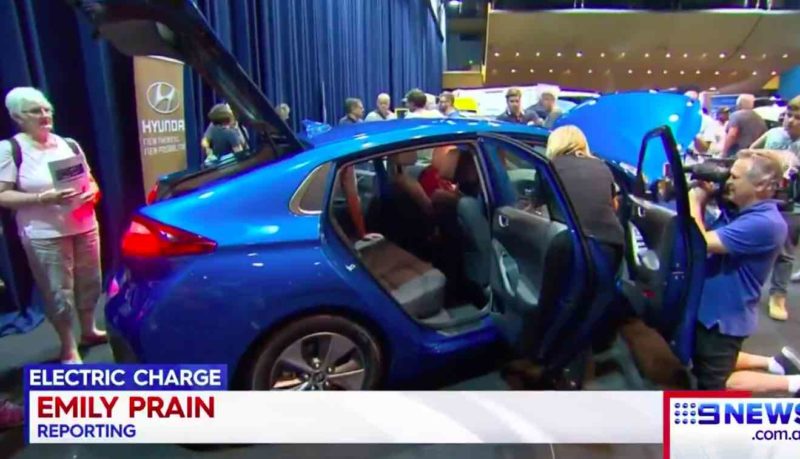The Queensland and ACT government have pushed the federal Coalition government to “get its head out of the sand” on electric vehicles and put together a national policy to encourage its uptake.
Queensland transport minister Mark Bailey said he and the ACT put the case to the COAG transport ministers meeting on Friday. The Northern Territory and the W.A. governments were supportive, he said. The other states – federal and state Coalition governments (Victoria is in caretake mode) – “didn’t say much.”
“This is the future that we are seeing,” Bailey said on Saturday, standing at the Australian Electric Vehicle Association conference in front of a full electric Hyundai Ioniq, which is poised to be the first full electric vehicle priced under $50,000 and with good range to be sold in Australia when it goes on sale in the next month.
“Canberra has ignored this issue for far too long,” Bailey said. “We are losing out on economic opportunites, we are losing out on jobs, and we are losing out on action on climate change by ignoring electric vehicles.
“Behind me is a Hyundai Ioniq. It is the first affordable 100% electric vehicles. Australia is well behind in electric vehicle policy …. electric vehicles are taking over the world.”
Bailey pointed to the UK, another major right-hand drive car market, which has a share of EVs to total new car sales of around 1.6 per cent. It is just 0.2 per cent in Australia. “We have got a measly amount. We should be transitioning, we can see the future is electric.
Independent Senator Tim Storer suggested on Friday that the Senate inquiry that he is chairing is likely to recommend targets and a range of incentives for electric vehicles when it hands down its report by December 4. He is currently working on gaining bi-partisan concensus.
Asked if there should be a target for EVs, like in New Zealand, which is aiming for 64,000 by 2021, or other countries which are looking to phase out sales of petrol and diesel cars, Bailey – a former Queensland state energy minister – pointed to the success of the renewable energy targets which had driven a boom in investment. Queensland has more than two dozen large scale renewable energy projects.
“Like we did with renewable energy, we’ve got to work with industry to encourage investment, encourage activity, get more models out here, get cheaper models out here,” Bailey said. “That’s not what we are getting from Canberra at the moment.”
Queensland has already installed what it calls the world’s longest state-based electric superhighway, with 16 fast-charing stations linking Coolongatta with Cairns.
It is looking to expand that and the state government is also doubling the number of EVs it has in its fleet every year for the next four years – including 14 Hyundai Ioniqs.
“Are you tired of really high fuel prices? Electric vehicles will give you fuel costs one third of what you pay now, and the maintenance cost will be one third.
“If you hate the fuel companies ripping you of at the bowser and you are in the market for a new car, I highly recommend an electric vehicle. This is the future, we have got to get our heads around this.”

Giles Parkinson is founder and editor of The Driven, and also edits and founded the Renew Economy and One Step Off The Grid web sites. He has been a journalist for nearly 40 years, is a former business and deputy editor of the Australian Financial Review, and owns a Tesla Model 3.


